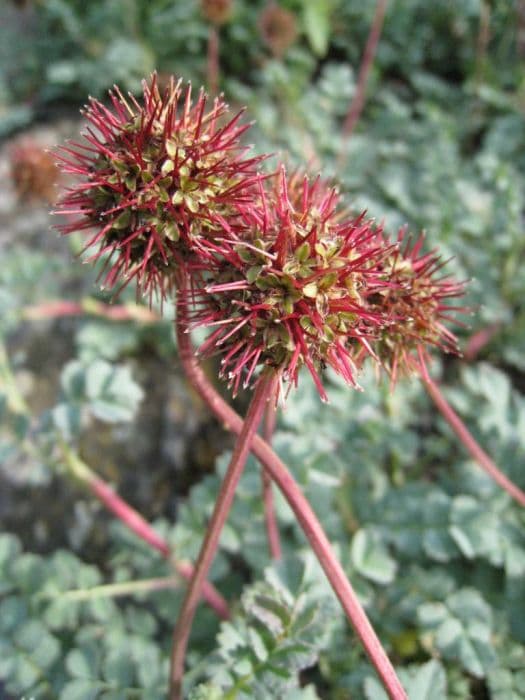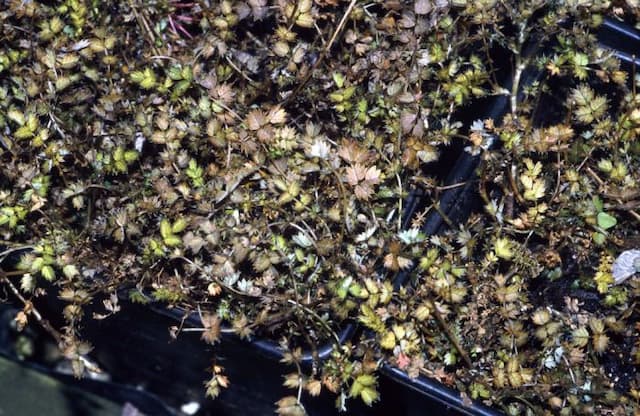Loving Memory Rose Rosa Loving Memory = 'Korgund81' (HT)
![rose [Loving Memory]](/_next/image?url=https%3A%2F%2Fplants-admin.emdemapps.com%2Fimages%2Fplants%2F%2Fimages%2F604b5c10f23fb.png&w=3840&q=75)
ABOUT
The Rosa Loving Memory, known commonly as a type of hybrid tea rose, presents a classic form with its elegantly shaped blooms. Its flowers are known for their vibrancy and rich coloration, often a deep red or similar variation that conveys a sense of warmth and commemoration; this makes it a common choice for memorials or tributes. Each bloom showcases a high-centered shape typical of hybrid tea roses, with the petals spiralling out from the center in a sophisticated display. The petals are smooth and velvety to the touch, with a subtle sheen that can catch the sunlight in outdoor settings, making the flowers glisten as though they were lightly polished. As the flowers mature, the outer petals may gracefully unfurl, giving a fuller and more opulent appearance to each flower. The foliage that accompanies these flowers is typically lush and dark green, offering a striking contrast against the brilliance of the blooms and creating an attractive backdrop that highlights their beauty. The plant itself is structured with an upright habit and branching stems that may bear solitary flowers or small clusters of blooms. Each stem displays a poised strength, capable of supporting the relatively large and elaborate flowers. Overall, Rosa Loving Memory embodies the classic beauty associated with hybrid tea roses, making it a cherished variety for both gardeners and those seeking to honor special memories with a living tribute.
About this plant
 Names
NamesFamily
Rosaceae
Synonyms
Loving Memory Rose, Hyrbid Tea Loving Memory
Common names
Rosa 'Korgund81'
 Toxicity
ToxicityTo humans
The common name for Rosa Loving Memory = 'Korgund81' (HT) is Hybrid Tea Rose. Hybrid Tea Roses are generally not considered poisonous to humans. They do not contain toxins that are harmful if ingested in small quantities. However, ingestion of large amounts of any plant material could potentially cause stomach upset or an intestinal blockage. It is always advisable to avoid eating any part of ornamental plants.
To pets
The common name for Rosa Loving Memory = 'Korgund81' (HT) is Hybrid Tea Rose. Hybrid Tea Roses are not considered toxic to pets such as dogs and cats. These plants do not contain substances known to be poisonous to animals. However, the thorns can cause physical injury if a pet tries to chew the plant, and eating any non-food plant material can potentially lead to gastrointestinal upset or an obstruction, especially if large quantities are ingested.
 Characteristics
CharacteristicsLife cycle
Perennials
Foliage type
Deciduous
Color of leaves
Green
Flower color
Red
Height
3-4 feet (0.9-1.2 meters)
Spread
2-3 feet (0.6-0.9 meters)
Plant type
Shrub
Hardiness zones
5
Native area
Cultivar
Benefits
 General Benefits
General Benefits- Aesthetic Appeal: The Loving Memory Rose provides vibrant red blooms that can enhance the beauty of gardens and landscapes.
- Emotional Significance: Its name and beauty make it an ideal plant for commemorating loved ones, contributing to its sentimental value.
- Pollinator Attraction: As with many roses, the Loving Memory Rose attracts pollinators like bees and butterflies, supporting biodiversity.
- Versatility: Suited for a variety of garden designs, including formal gardens, rose beds, and as standalone specimens.
- Long Blooming Season: It typically has a long flowering period, offering color and interest for an extended time during the growing season.
- Gift Potential: Due to its symbolic meaning and attractive appearance, it is often given as a gift for memorials or special occasions.
 Medical Properties
Medical PropertiesThis plant is not used for medical purposes.
 Air-purifying Qualities
Air-purifying QualitiesThis plant is not specifically known for air purifying qualities.
 Other Uses
Other Uses- Perfumery: The petals of the Loving Memory rose can be distilled to produce a delicate rose oil or essence, which is a prized ingredient in perfumery.
- Culinary Delights: The rose petals and hips are edible and can be used to add a floral note to dishes, jams, and desserts, such as rose-flavored ice creams or pastries.
- Botanical Art: The striking blooms of the Loving Memory rose can be used in botanical art and pressed flower crafts due to their vibrant color and form.
- Celebration Confetti: Dried rose petals can serve as natural, biodegradable confetti for weddings and other celebrations, offering an environmentally friendly alternative to traditional paper confetti.
- Craft Dye: The petals can be boiled to create a natural dye for fabrics, yarns, or paper, giving them a soft pink to deep red hue, depending on the concentration.
- Garden Design: Loving Memory rose bushes can be used in formal garden designs to create patterned walks or border edges, contributing to the aesthetic appeal of the landscape.
- Aromatherapy: The scent emitted by the Loving Memory rose petals can be used in sachets or potpourris for a calming and soothing natural fragrance in homes.
- Symbolic Planting: The rose can be planted in memory gardens or as a commemorative plant in honor of loved ones, reflecting the very essence of its name and providing a living tribute.
- Tea Flavoring: Petals of the Loving Memory rose can be used to flavor tea, imparting a subtle rose aroma and taste to the beverage.
- Photography: The striking appearance of the Loving Memory rose makes it a favorite subject for photographers, who often use it in floral compositions due to its rich color and classic form.
Interesting Facts
 Feng Shui
Feng ShuiThe plant Hybrid Tea Rose can be used in Feng Shui to create a positive and loving energy in the garden or home. It is associated with love and healing, so placing this rose in the southwest area of your garden, which is connected to love and marriage, can enhance romantic relationships. Additionally, the bright red or pink flowers can bring vibrant yang energy, stimulating happiness and passion.
 Zodiac Sign Compitability
Zodiac Sign CompitabilityThe Hybrid Tea Rose is not used in astrology practice.
 Plant Symbolism
Plant Symbolism- Love: The rose is universally regarded as a symbol of love, often linked to deep affection and romantic relationships.
- Memory: The name 'Loving Memory' implies that the rose can be a symbol for remembrance, often used to honor and remember someone who has passed away.
- Beauty: Roses have long been associated with beauty due to their elegant and attractive blooms, symbolizing both inner and outer beauty.
- Honor: Roses are also used to convey respect and admiration, commonly gifted to show esteem for another person.
- Devotion: The enduring nature of a rose's bloom can represent devotion and loyalty in a relationship.
- Passion: Depending on the color, especially deep red roses can symbolize profound emotions and passionate love.
 Water
WaterHybrid Tea Roses, like the 'Loving Memory' rose, should be watered deeply once a week, providing about 1-2 gallons of water per rose bush. During hot or dry weather, the frequency may increase to twice a week. It's important to water at the base of the plant to keep the foliage dry and reduce the risk of diseases. Always ensure the soil is moist but not waterlogged, so adjust your watering according to rainfall and soil drainage.
 Light
LightHybrid Tea Roses, including the 'Loving Memory' rose, thrive in full sunlight. They require at least 6 hours of direct sun daily, so it's best to position them in a spot that receives sun throughout the day. Morning sunlight is particularly beneficial as it helps dry dew from the leaves, reducing the risk of disease.
 Temperature
TemperatureThe 'Loving Memory' Hybrid Tea Rose performs well in a range of temperatures but prefers a consistent climate between 65-75°F. While these roses can survive brief periods outside this range, it's best to avoid exposure to temperatures below 32°F and above 90°F to prevent stress and damage to the plant.
 Pruning
PruningPruning 'Loving Memory' Hybrid Tea Roses is important to maintain their shape, encourage air circulation, and promote healthy blooms. Prune in the early spring as new growth begins, removing dead or damaged wood and shaping the plant. Additionally, deadhead spent blooms throughout the flowering season to encourage more flowers. Prune again lightly in late autumn to prepare the rose for winter.
 Cleaning
CleaningAs needed
 Soil
SoilHybrid Tea Roses such as 'Loving Memory' thrive in well-draining, fertile loamy soil with a pH between 6.0 and 6.5. An ideal soil mix could include equal parts garden loam, peat moss, and perlite or compost to improve texture and nutrient content.
 Repotting
Repotting'Loving Memory' Hybrid Tea Roses are typically not repotted as they're grown outdoors; instead, they may require transplanting every few years if conditions necessitate. If grown in containers, repotting every 2 to 3 years in spring is advised to refresh the soil and encourage vigor.
 Humidity & Misting
Humidity & MistingHybrid Tea Roses like 'Loving Memory' prefer average outdoor humidity levels between 40% and 60%. Too high humidity can promote fungal diseases, so it's crucial to ensure good air circulation around the plant.
 Suitable locations
Suitable locationsIndoor
Ensure bright light, consistent watering, and ample airflow for growth.
Outdoor
Plant in full sun with well-draining soil and space for air circulation.
Hardiness zone
5-10 USDA
 Life cycle
Life cycleThe Hybrid Tea Rose, 'Loving Memory' begins its life as a dormant bare-root plant or a potted specimen. After planting, the rose enters a vegetative stage where it focuses energy on developing a strong root system and producing stems and leaves. It then progresses to the blooming stage where it forms flower buds that eventually unfurl into the characteristic large, fragrant blooms in red or shades of red. Following pollination, which can be done by insects or manually, the plant may produce hip fruits containing seeds, though many hybrid varieties like 'Loving Memory' are often sterile. Once the blooming period is over, the plant will enter a period of senescence, where leaves may yellow and drop as the plant prepares for dormancy. Finally, during the dormant period in colder climates, the plant conserves energy and rests until conditions are suitable for the next growth cycle.
 Propogation
PropogationPropogation time
Late winter-early spring
Propogation: The Rosa 'Loving Memory', also known as 'Korgund81' which falls under Hybrid Tea roses, is typically propagated through softwood cuttings, a popular method for many roses. This practice is usually done in late spring to early summer when new growth is still tender and green. Softwood cuttings are taken from the new growth of the plant which should be about 4-6 inches (10-15 cm) long. They should have a couple of leaves. The cut end of the cutting is often dipped in rooting hormone to accelerate root development and then planted in a moist potting mix. It is important to keep the soil evenly moist and to place the cutting in a bright location without direct sun exposure to avoid wilting. Under the right conditions, roots will generally begin to form in 3-4 weeks.









